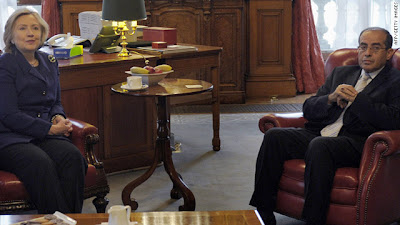Military action against Libyan leader Moammar Gadhafi will continue until he "ceases his attacks on civilians, pulls his troops back from places they have forcibly entered and allows key services and humanitarian assistance to reach all Libyans," Secretary of State Hillary Clinton vowed Tuesday.
The United Nations-backed bombing of Gadhafi's forces "prevented a potential massacre," she said.
Clinton spoke in London after meeting with a leader of the Libyan opposition as the United States sought to expand ties with rebel leaders fighting to oust Gadhafi.
It was the second meeting in less than two weeks between Clinton and the Libyan Interim National Council's Mahmoud Jabril, a former head of Libya's economic
Clinton wanted to gain a "clearer picture" of the opposition and how a post-Gadhafi government could look, according to a senior official who took part in the meeting.
The meeting came on the sidelines of a conference in London on the future of Libya.
Envoys came from more than 40 countries and international organizations, including members of the coalition supplying airpower to protect civilians against Gadhafi forces.
U.N. Secretary-General Ban Ki-moon and African Union Commission Chairman Jean Ping are among dozens of key players at the summit trying to hammer out a way forward on Libya.
Diplomats will address how to enforce other aspects of this month's U.N. Security Council resolution authorizing a no-fly zone, including humanitarian aid to Libya and ways to tighten the rope around Gadhafi through sanctions and political support for the rebels.
They will seek to solidify NATO's command of the military campaign and create a contact group of nations seeking to provide political support for the Libyans, U.S. officials said.
Jabril also met ahead of the conference with British Foreign Secretary William Hague, who said in a statement he discussed humanitarian aid and "priorities for international assistance."
The Obama administration also will send a liaison to the eastern Libyan city of Benghazi to open up a more direct line of communication with members of the opposition, a senior administration official told reporters Tuesday
Chris Stevens, a former charge d'affaires at the U.S. Embassy in Tripoli, has been appointed to deal with the opposition.
For security reasons, the official would not give specifics as to when Stevens would be in Libya, but said he would travel there "soon" in an effort to "establish more systematic interaction" with the opposition.
"This is one of the issues that still need to be sorted out" legally and logistically, the senior U.S. official traveling with Clinton said Tuesday. "We have an increasingly clear sense of a number of the Libyan leaders" in the opposition.
U.S. officials have been clear that although they know some figures in the new Libyan Interim National Council, they are not ready to join France and Qatar, who have formally recognized the group as the legitimate representative of the Libyan people.
In a nationally televised address Monday, President Barack Obama accused Gadhafi of "brutal repression" and creating a "looming humanitarian crisis," which he said forced the United States to act along with the international community.
He said that the United States is searching for ways to make available to the opposition more than $30 billion in Gadhafi's funds recently frozen by the U.S. Treasury department.
Gene Cretz, the U.S. ambassador to Libya, said last week the Libyan Council is "off to a good start" in organizing politically, providing basic services and embracing a vision of human rights.
Cretz has been working out of State Department headquarters in Washington since the United States closed its embassy in Tripoli last month.
The ambassador praised a document from the council that "presented "their vision of what a future Libya would look like, and it had all the right elements in it in terms of human rights, in terms of women's rights, in terms of equal participation," he said.
But he said while the opposition's representatives "do not seem to be, at least in the statements and the actions that they've taken, in any way incompatible with the kind of ideals that we would be advocating," the United States still had more to learn about the Libyan council.
"We have to be very careful about, you know, who might be included in the future and how they go about forming a government, if in fact they have that opportunity," Cretz said.
 Twitter
Twitter


0 comments:
Post a Comment